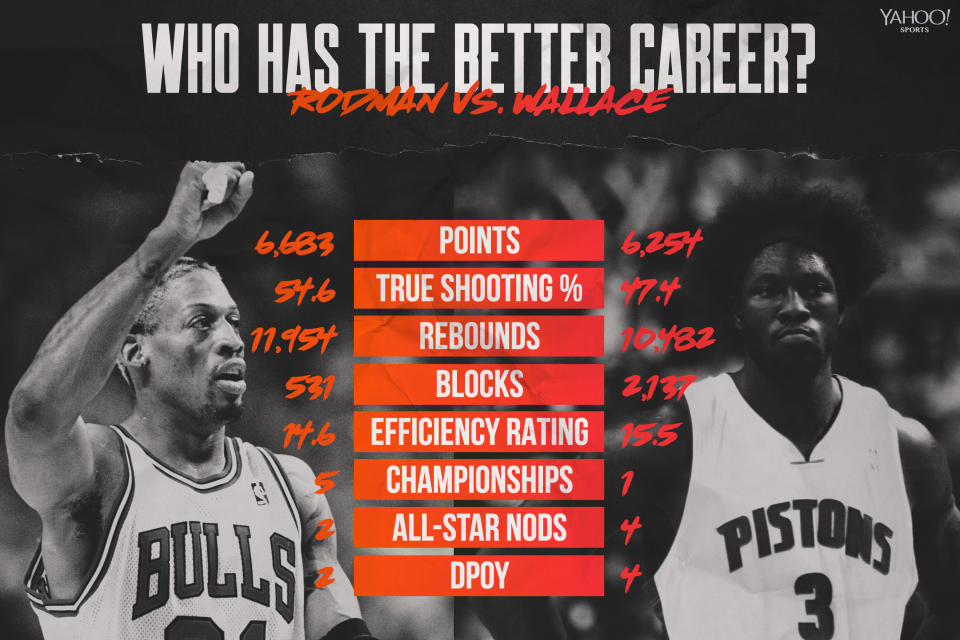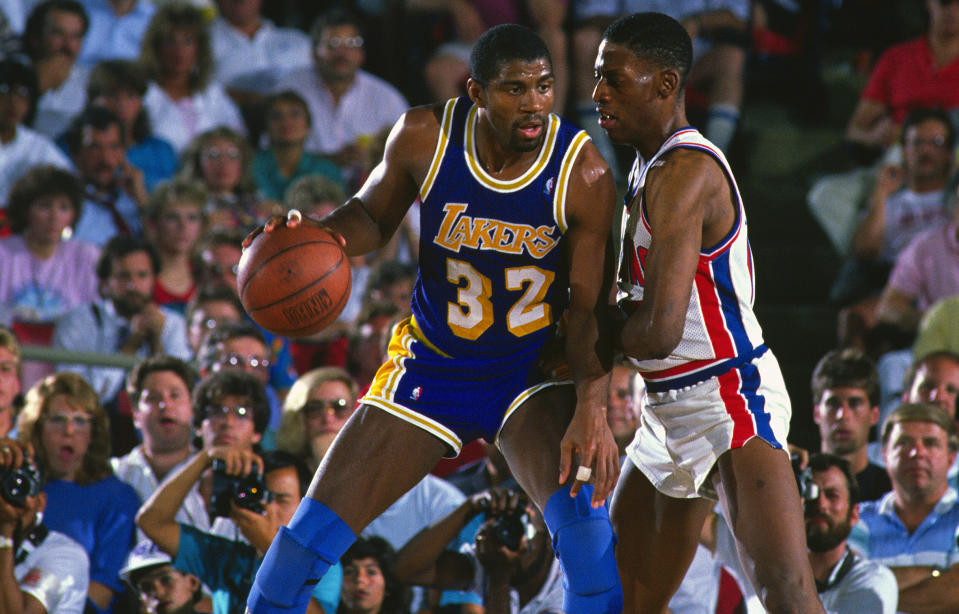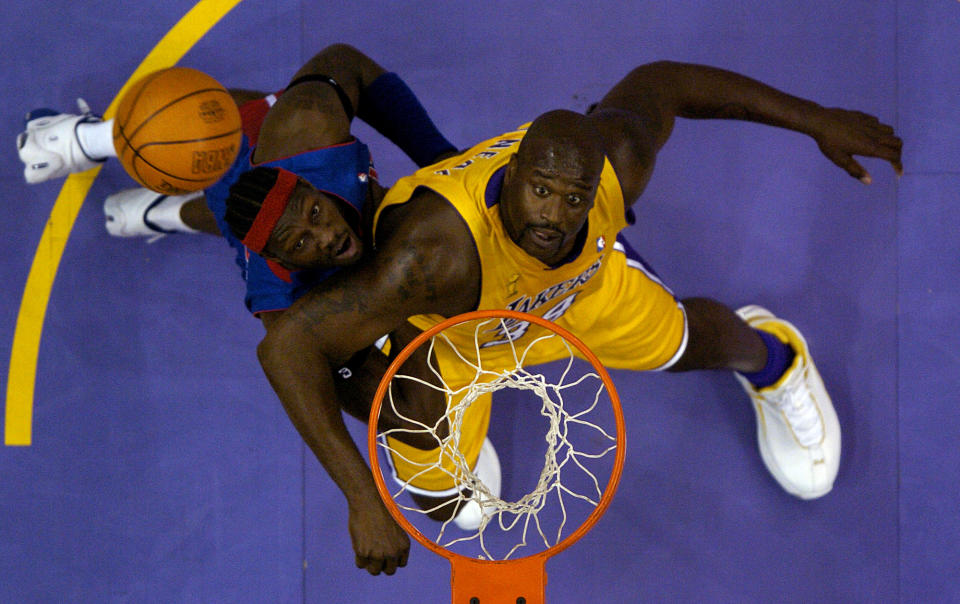Whose NBA career is better? Dennis Rodman vs. Ben Wallace

Victors are determined decisively on the court, but one great joy of fandom outside the lines has no clear winner. We love to weigh the merits of our favorite players against each other, and yet a taproom full of basketball fans can never unanimously agree on the GOAT. In this series, we attempt to settle scores of NBA undercard debates — or at least give you fodder for your next “Who is better?” argument.
[Previously: Dwyane Wade vs. Dirk Nowitzki • Carmelo Anthony vs. Vince Carter • Kobe Bryant vs. Tim Duncan • Chris Paul vs. Isiah Thomas • Pau Gasol vs. Manu Ginobili • Patrick Ewing vs. David Robinson • Shaquille O’Neal vs. Hakeem Olajuwon • Larry Bird vs. Magic Johnson • Wilt Chamberlain vs. Bill Russell • Jason Kidd vs. Steve Nash • Ray Allen vs. Reggie Miller • Charles Barkley vs. Karl Malone • Grant Hill vs. Tracy McGrady]
THE MATCHUP: Dennis Rodman vs. Ben Wallace
Prime numbers
In 1988-89, his third season on the Detroit Pistons, Rodman led the league in field-goal percentage (59.5) and debuted on the All-Defensive First Team coming off the bench en route to his first NBA championship. A decade later, in his final season on the Chicago Bulls, he still led the league in rebounding and won his fifth title. Let’s call that his prime, even if he was productive for the Pistons in Year 2 of a 14-year career and still cleaned the glass through his final stint with the Dallas Mavericks.
During that 10-year stretch from 1988-98, Rodman averaged 7.2 points (51.5 FG%, 59.6 FT%), 14.6 rebounds, 1.9 assists and 1.3 combined blocks and steals in 34.2 minutes per game. In that span, Rodman’s teams — the Pistons, San Antonio Spurs and Bulls — only missed the playoffs once and lost in the first round twice. He reached the conference finals seven times and captured the five championships.
Rodman’s Hall of Fame teammates during that span: Isiah Thomas, Joe Dumars, David Robinson, Michael Jordan and Scottie Pippen. He is in the Hall of Fame, too.
Wallace did not emerge as an elite rebounder until Year 5 of his 16-year career, the season before he won the first of four Defensive Player of the Year honors in a five-year stretch, and by Year 12 he was back down to single-digit averages and out of All-Defensive consideration. The seven-year window in between was his prime.
During that stretch from 2000-07, Wallace averaged 7.7 points (47.2 FG%, 42.2 FT%), 12.6 rebounds, 1.8 assists and 4.3 combined blocks and steals in 36.3 minutes per game. In that span, his teams — six seasons in Detroit and one in Chicago — also missed the playoffs just once and never lost in the first round. He played in four straight conference finals and two NBA Finals, winning the 2004 title.
Wallace’s All-Star teammates on that run — Jerry Stackhouse, Chauncey Billups, Richard Hamilton and Rasheed Wallace — are still waiting on a Hall call. So is he.
As rebounders, there is no question Rodman was better. His offensive, defensive and total rebounding percentages are all vastly superior to Wallace’s. In fact, Rodman’s career offensive rebounding percentage (17.5) is the highest in history. Wallace was a better rim protector, more than tripling Rodman’s STOCKS average, but most of Rodman’s defensive work was done well before his man ever got the ball, as he was arguably more relentless on that end than anyone we’ve ever seen.
In the end, Rodman’s teams owned a top-five defensive rating in seven of his 10 prime seasons, finishing top three on four occasions and leading the league once — in Chicago’s record-setting 72-10 season. Wallace’s teams produced a top-five defensive rating in five of his seven prime seasons, finishing top three thrice and also leading the league once. However you feel about the discrepancy between their Defensive Player of the Year awards and championship rings, most teams would take the three extra prime seasons from Rodman, suspensions be damned.
Advantage: Rodman

Career high
It is hard to pin down a player’s pinnace when an everlasting defensive effort is their defining characteristic on five championship teams. Was Rodman’s peak the 1989-90 campaign that ended in a title, when he made his first All-Star team and won his first of two straight Defensive Player of the Year honors despite coming off the bench for half the year? Was it 1991-92, when he made his second All-Star bid and averaged a career-high 18.7 rebounds per game? Or 1995-96, when he was the best rebounding and defending power forward on maybe the greatest team ever?
Rodman’s career was a series of peaks and valleys, but in those peaks he was the NBA’s best rebounder on both ends, its best defender — capable of guarding all five positions — and even its most selective scorer as a mop-up man in 1988-89.
Rodman was never more relevant than during his first season with the Bulls, when at age 34 he led the league with 14.9 rebounds in just 32.6 minutes per game for a 72-win championship team, joining Jordan and Pippen on First Team All-Defense. Rodman’s numbers spiked in the playoffs, and he played an invaluable role in the 1996 Finals, twice grabbing 11 offensive rebounds in hard-fought Games 2 and 6 victories. Seattle SuperSonics coach George Karl credited Rodman for both wins, and there is an argument to be made that he deserved Finals MVP recognition.
In the six-game set against the Sonics, Rodman averaged 7.5 points (48.6 FG%, 57.9 FT%), 14.7 rebounds and 2.5 assists in 37.5 minutes per game. His chief defensive assignment, All-Star Shawn Kemp, averaged 23.3 points (55.1 FG%, 85.7 FT%), 10 rebounds and 2.2 assists in 40.3 minutes a night during the series.
Wallace’s peak is easier to pin down. In 2001-02 and 2002-03, he won two straight Defensive Player of the Year awards, led the league in rebounding both seasons and averaged an NBA-best 3.5 blocks per game in the first of those years. Oddly enough, though, his apex was probably the one year he did not win the DPOY award over a five-year stretch — 2003-04, when he was the Second Team All-NBA center behind Shaquille O’Neal and beat Shaq’s Los Angeles Lakers in the Finals.
During that season, Wallace averaged 9.5 points (42.1 FG%, 49.0 FT%), 12.4 rebounds, 1.7 assists and 4.8 combined steals and blocks in 37.7 minutes per game for a 54-win Pistons team. He averaged a 10-14-2 with a couple steals and blocks per game throughout the playoffs, submitting his best game of the season — 18 points (8-13 FG) and 22 rebounds — in the close-out Game 5 in the Finals.
In the five-game series agains the Lakers, Wallace averaged 10.8 points (47.8 FG%, 29.4 FT%), 13.6 rebounds, 1.4 assists and 2.8 combined blocks and steals in 41 minutes. His chief defensive assignment, the legend O’Neal, averaged 26.6 points (63.1 FG%, 49.1 FT%), 10.8 rebounds and 1.6 assists in 42.6 minutes per game.
You could argue that an engaged Rodman — the guy who could stop anyone defensively and grab every rebound in his vicinity — was better at his apex, and that the best team ever may have been in trouble in the Finals if it were not for Rodman. But Wallace was more reliably productive at his peak, and he limited Shaq to Kemp-like numbers in a five-game beating of the three-time champion Lakers.
Advantage: Wallace

Clutch gene
During his seven-year prime, Wallace played in six advance-or-go-home games (five Games 7 and a first-round Game 5), and his teams finished with a 5-1 record in those instances, losing only Game 7 of the 2005 Finals to Tim Duncan’s Spurs. In those games, Wallace averaged a healthy 9.5 points (55.6 FG%, 7-27 FT), 11 rebounds, 2.3 assists (against 1.7 turnovers) and four combined blocks and steals.
When considering the highest-pressure games of that run, two come to mind — both during Detroit’s title defense in 2005. In Game 7 of the Eastern Conference finals against the Miami Heat that season, Wallace registered eight points on nine shots and nine rebounds, “holding” Shaq to 27 points on 12-of-19 shooting in defeat. In Game 7 of the Finals that year, Wallace totaled 12 points (6-10 FG, 0-2 FT) and 11 rebounds, as Duncan finished with 25 points on 10-for-27 shooting.
On their way to the 2004 title, the Pistons played in one do-or-die game — Game 7 of the conference semifinals against a New Jersey Nets team that was coming off two straight Finals trips. Wallace had a stellar night, compiling 18 points (on 8-of-10 shooting), eight rebounds, two assists and a couple blocks in a 90-69 drubbing.
Rodman remarkably only played in four advance-or-go-home games in his prime, probably because he played with Thomas and Jordan — two vicious playoff killers at their absolute best. His teams finished 3-1 in those games, losing to Patrick Ewing’s New York Knicks in the first round of the 1992 playoffs at the tail end of the Bad Boy Pistons era. Rodman averaged 7.3 points (58.3 FG%, 1-6 FT), 11 rebounds, 1.5 assists (against one turnover) and 1.5 combined blocks and steals.
Again, two games stand out as the biggest of that stretch — one Game 7 against Jordan’s Bulls and another with Jordan’s Bulls. In Game 7 of the 1990 Eastern Conference finals, Rodman totaled 13 points on 6-of-7 shooting and nine rebounds, holding Horace Grant — the man he later replaced in Chicago — to 10 points on 3-of-17 shooting. Eight years later, coming off the bench for a Bulls team on its last legs for a Game 7 against the Indiana Pacers in the 1998 Eastern Conference finals, Rodman posted just two points and six rebounds. He did finish a plus-13 in 28 minutes during the 88-83 victory, largely holding Dale and Antonio Davis in check.
Their Finals averages during prime seasons:
Rodman (26 games): 4.2 points (47.6 FG%, 58.0 FT%), 9.5 rebounds and 1.5 assists in 28.6 minutes per game (for teams that finished 5-0 in Finals series)
Wallace (12 games): 10.8 points (52.9 FG%, 34.5 FT%), 11.7 rebounds, 1.2 assists and 3.9 combined blocks and steals (for teams that finished 1-1 in Finals series)
The biggest point in Rodman’s favor: He was 5-0 in the Finals during his prime. The biggest knock against him: He blew a potential series-winning put-back in the final seconds of Game 6 of the 1988 Finals that would have given the Pistons another title, and Rodman’s last-minute foul followed by an ill-advised shot might have cost them Game 7, too, even if his defense opposite Magic Johnson was a big reason they were in position to win a championship during his nascent age 26 season.
How much credit does Rodman deserve for those five titles? A decent chunk, for sure, one difficult to quantify based on his skill set, and the sheer amount of playoff games he played provided more chances for both success and failure in big moments. Wallace is just as tough to judge, particularly in the clutch, where neither was a go-to offensive option and both were backbones of wrecking-ball defenses.
Again, this comes down to reliability: If you had to count on one guy for one game in a big moment, who was less likely to combust? I think it’s probably Wallace, even if Rodman’s defensive versatility lent itself to getting a stop when you need it most.
Advantage: Wallace
Hardware
• Rodman: Five-time NBA champion; two-time Defensive Player of the Year; two-time All-Star; two-time Third Team All-NBA selection; eight-time All-Defensive selection (7x First Team); seven-time rebounding champion
• Wallace: 2004 NBA champion; four-time Defensive Player of the Year; four-time All-Star; five-time All-NBA selection (3x Second Team, 2x Third Team); six-time All-Defensive selection (5x First Team); two-time rebounding champion; 2002 blocks leader
Wallace has two more Defensive Player of the Year honors than Rodman (who finished runner-up in 1991), two more All-Star appearances and two more All-NBA nods, but Rodman has a couple more First Team All-Defense bids, five more rebounding titles and the big one — four more NBA championships. Take the rings.
Advantage: Rodman
For the culture
When you think Ben Wallace, two things jump to mind unrelated to his all-world defense — that glorious Afro and the fact that his shove of Ron Artest, followed by a towel throw, preceded the 2004 brawl that resulted in the Malice at the Palace.
These are nothing compared to the laundry list of cultural moments Rodman has provided, for better and worse. His various hairstyles were only the start. There was the time in the early 1990s when Madonna allegedly offered him $20 million to impregnate her. Or the time in 1996 when he arrived to a book promotion in a wedding dress, declared his bisexuality and proposed marriage to himself. Or the time in the 1998 Finals when he missed a practice to wrestle Hulk Hogan. Or the time in November 1998 when he briefly married “Baywatch” star Carmen Electra.
Two decades later, he is somehow a central figure in foreign relations between Donald Trump and Kim Jong-Un, thanks to his bizarre friendship with the North Korean dictator. None of this represents a cultural ideal. In fact, Rodman’s story gets darker. Much darker. But there is simply no denying his cultural impact.
Advantage: Rodman
THE DAGGER: Dennis Rodman is better.
If you have an idea for a matchup you would like to see in this series, let us know.
– – – – – – –
Ben Rohrbach is a staff writer for Yahoo Sports. Have a tip? Email him at rohrbach_ben@yahoo.com or follow him on Twitter!Follow @brohrbach


